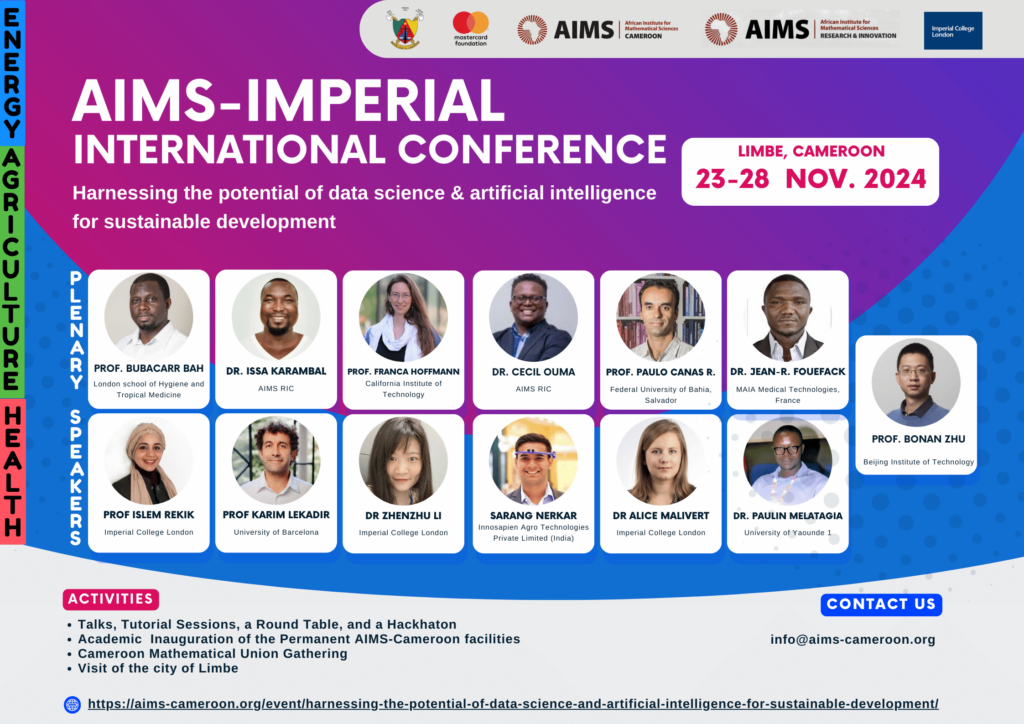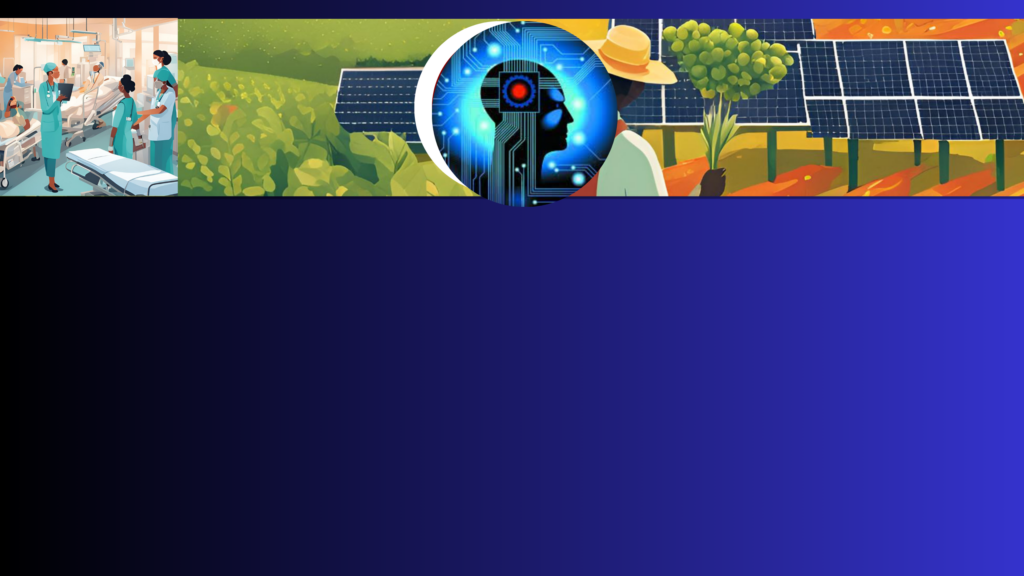About the conference
The main objective of this international conference is to bring together renowned experts and users of Data Science (DS) and Artificial Intelligence (AI) to discuss not only on the recent advances in DS and AI but also to illustrate how the great potential of DS and AI can be harnessed to contribute to sustainable local development, related to domains including agriculture, energy, climate, finance and health. As a secondary objective, we shall cease this opportunity of the coming together of renowned scientists, mathematicians, Industry experts, Head of Mathematics Departments and Deans of private and State universities from Cameroon and from neighboring countries to strategise on the setting-up of new Bachelor, Master Degree Programmes, as well as multidisciplinary research Programmes in DS and AI in Cameroon and the sub-region. Further, students will take direct action in a hackathon focused on affordable AI in healthcare imaging, agriculture and energy. Finally, within the framework of this conference, the new AIMS-Cameroon permanent facilities will be inaugurated and the Cameroon Mathematical Union will hold its 2024 annual meeting, with the main objective to revisit its status and renew its bureau.

Partners

AIMS Research and Innovation Centre (AIMS RIC)
Programme de bourses Mastercard Foundation
The Government of Cameroon
Organizers
Imperial College London, United Kingdom
AIMS Research and Innovation Centre (AIMS-RIC), Rwanda
AIMS-Cameroon, Cameroon
Organizing Committee
Zhenzhu Li, Imperial College London, UK
Islem Rekik, Imperial College London
Alice Mathilde Marie Malivert, CIRAD (France) – Imperial (United Kindgom)
Prof. Dr. Foupouagnigni Mama, AIMS-Cameroon & University of Yaounde 1
Dr. Daniel Duviol Tcheutia, AIMS-Cameroon & University of Yaounde 1
Ms. Nathalie Wandji, AIMS-Cameroon
Prof. Wilfred Ndifon, AIMS Research and Innovation Centre (AIMS-RIC), Rwanda
Isambi Sailon Mbalawata, AIMS Research and Innovation Centre (AIMS-RIC), Rwanda
Keynote Speakers
Pr. Karim Lekadir, the University of Barcelona, Spain
Pr. Bonan Zhu, Beijing Institute of Technology, China
Pr. Franca Hoffmann, California Institute of Technology, USA
Pr. Paulo Canas Rodrigues, the Federal University of Bahia, Brazil
Pr. Islem Rekik, Imperial College London, UK
Dr. Zhenzhu Li, Imperial College London, UK
Dr. Alice Malivert, Imperial College London, UK
Dr. Bubacarr Bah, Medical Research Council Unit, The Gambia
Dr. Issa Karambal, AIMS Research and Innovation Centre, Rwanda
Dr. Cecil Ouma, AIMS Research and Innovation Centre, Rwanda
Dr. Jean-Rassaire Fouefack, MAIA Medical Technologies, France
Dr. Paulin Melatagia, University of Yaounde 1, Cameroon
Sarang Nerkar, Innosapien Agro Technologies Private Limited (India)
Formulaire d'inscription
Click on this link to register and receive Zoom credentials on November 22, 2024.
Tentative Programme
Saturday, 23 November 2024
From 10:00 am: Arrival and registration of the participants (only for in-person participants)
Sunday, 24 November 2024
08:45-09:00| Welcome address by Prof. Dr. Mama Foupouagnigni, AIMS-Cameroon Centre President and AIMS Global Network Chief Academic Officer
09:00-10:00| Plenary talk 1: AI image analysis for biological insights and agriculture advancements By Alice Mathilde Marie Malivert
10:00-10:30| Coffee break and Poster Session
10:30-11:30| Plenary talk 2: Harnessing Humanistic Intelligence: AI for Agricultural Productivity and Food Security By Sarang Nerkar
11:30-12:15| Talk 3: An Accurate Image-based Case-Based Reasoning System to Profile Maize Attacks By Franklin Tchakounte
12:15-13:00| Talk 4: Parametric estimation of lifetime distribution based on interval censured observations. Application to cocoa data By Patrice Takam Soh
13:00-14:00| Lunch
14:00-17:00| Visit of the city of Limbe: Botanical Garden, Zoo etc. for international participants
14:00-17:00| Revision of the status and renewal of the bureau of the Cameroon mathematical Union
18:30-20:00| Dinner
Monday, 25 November 2024
08:30-09:30| Plenary talk 5: From Barcelona to Marrakesh to Nairobi: Collaborative AI for Global Health By Karim Lekadir
09:30-10:30| Plenary talk 6: New trends in AI for Healthcare By Islem Rekik
10:30-11:00| Coffee break and Poster session
11:00-11:45| Talk 7: Clinical Adoption of AI-driven Medical Imaging Technologies By Jean-Rassaire Fouefack
11:45-12:30| Talk 8: Healthcare and AI in Africa: Enhancing access and outcomes By Patrice Monkam
12:30-13:15| Talk 9: Solutions to the Breast Tumor model in MMTV-PyMT Mice using Operator Learning By Dinna Ranirina
13:15-14:45| Lunch
14:45-15:30| Plenary talk 10: On the Convergence of Gradient Descent for Linear Neural Networks By Bubacarr Bah
15:30-16:00| Talk 11: Federated learning applications in medicine By Michael Ranjit Alummoottil
16:00-16:30| Talk 12: Trustworthy AI in Low-Resource Medical Imaging: Leveraging Uncertainty Estimation for Reliable Outcomes By Jeremiah Fadugba
16:30-17:00| Coffee break and Poster session
17:00-17:45| Session 13: Practical session on Federated Learning By Michael Ranjit Alummoottil
18:30-20:00| Dinner
Tuesday, 26 November 2024
08:30-09:30| Plenary talk 14: Random structure searching for accelerated materials discovery By Bonan Zhu
09:30-10:30| Plenary talk 15: Multi-objective search on alloy perovskite landscape By Zhenzhu Li
10:30-11:00| Coffee break and Poster session
11:00-11:45| Plenary talk 16: Backcasting Energy in Society 5.0: The role of generative AI and digital twins in building resilient energy systems By Cecil Naphtaly Moro Ouma
11:45-12:30| Talk 17: Using synthetic data for training Artificial Intelligence (AI) models: issues in monitoring and evaluating advances in sustainable developments goals (SDGs) By Georges Nguefack-Tsague
12:30-13:00| Talk 18: Spatial Heterogeneity of Present and Future Habitat Suitability for Rift Valley Fever in Rwanda: An Ecological Niche Modelling Approach By Brigitte UMUTONI
13:00-14:30| Lunch
14:30-17:30| Round Table on strategies to harness the power of DS and IA for local development including setting up of new multidisciplinary research programmes and new Bsc. and Msc. Degree Programmes
18:30-20:00| Opening Ceremony and Conference Dinner
Wednesday, 27 November 2024
08:30-09:15| Plenary talk 19: Dynamics of Strategic Agents and Algorithms as PDEs By Franca Hoffmann
09:15-10:00| Plenary talk 20: Hybrid methods for time series forecasting By Paulo Canas Rodrigues
10:00-10:30| Coffee break and Poster session
10:30-11:15| Plenary talk 21: PINNs approach for drying capillary porous materials By Issa Karambal
11:15-12:00| Plenary talk 22: Exploring Tone Detection in African languages for Automatic Speech Recognition By Paulin Melatagia Yonta
12:00-12:30| Contributed talk 23: AI-Based Behavioral Analysis of Responsive Parenting: Insights from Real-World Data By Irene E. Uwerikowe
12:30-13:00| Contributed talk 24: Artificial intelligence: an opportunity for education in Africa By Dr. Kouakep Tchaptchié Yannick
13:00-14:30| Lunch
14:30-15:00| Contributed talk 25: Introduction to Support Vector Machines By Nathalie Wandji & Wolfram Koepf
15:00-17:30| Visit of the permanent facility of AIMS-Cameroon
18:30-20:00| Conference Dinner
Thursday, 28 November 2024
08:30-09:00| Contributed talk 26: A Quantum-Inspired Higher-Order Topological Layer for Enhancing Graph Neural Networks By Peguy Kem-Meka
09:00-09:30| Contributed talk 27: Spatial-temporal patterns in environmental noise pollution in Kigali, Rwanda By Jean Remy Kubwimana
09:30-10:00| Contributed talk 28: A zero-knowledge identification protocol based on graph theory and Guillou-Quisquater scheme By Leila Zahhafi
10:00-10:30| Contributed talk 29: Assessing the performance of a monocrystalline solar panel under different tropical climatic conditions in Cameroon using artificial neural network
By Claire Olivic Dongmo
10:30-11:00| Talk 30: Cameroon Climate predictions using the SARIMA-LSTM machine learning model: Adjustment of a climate model for the Sudano-Sahelian zone of Cameroon By NGONGO Isidore Séraphin
11:00-11:30| Coffee break and Poster session
11:30-12:00| Contributed talk 31: Hackathon Presentation 1
12:00-12:30| Contributed talk 32: Hackathon Presentation 2
12:30-13:00| Contributed talk 33: Hackathon Presentation 3
13:00-13:30| Closing Ceremony
13:30-15:00| Lunch

